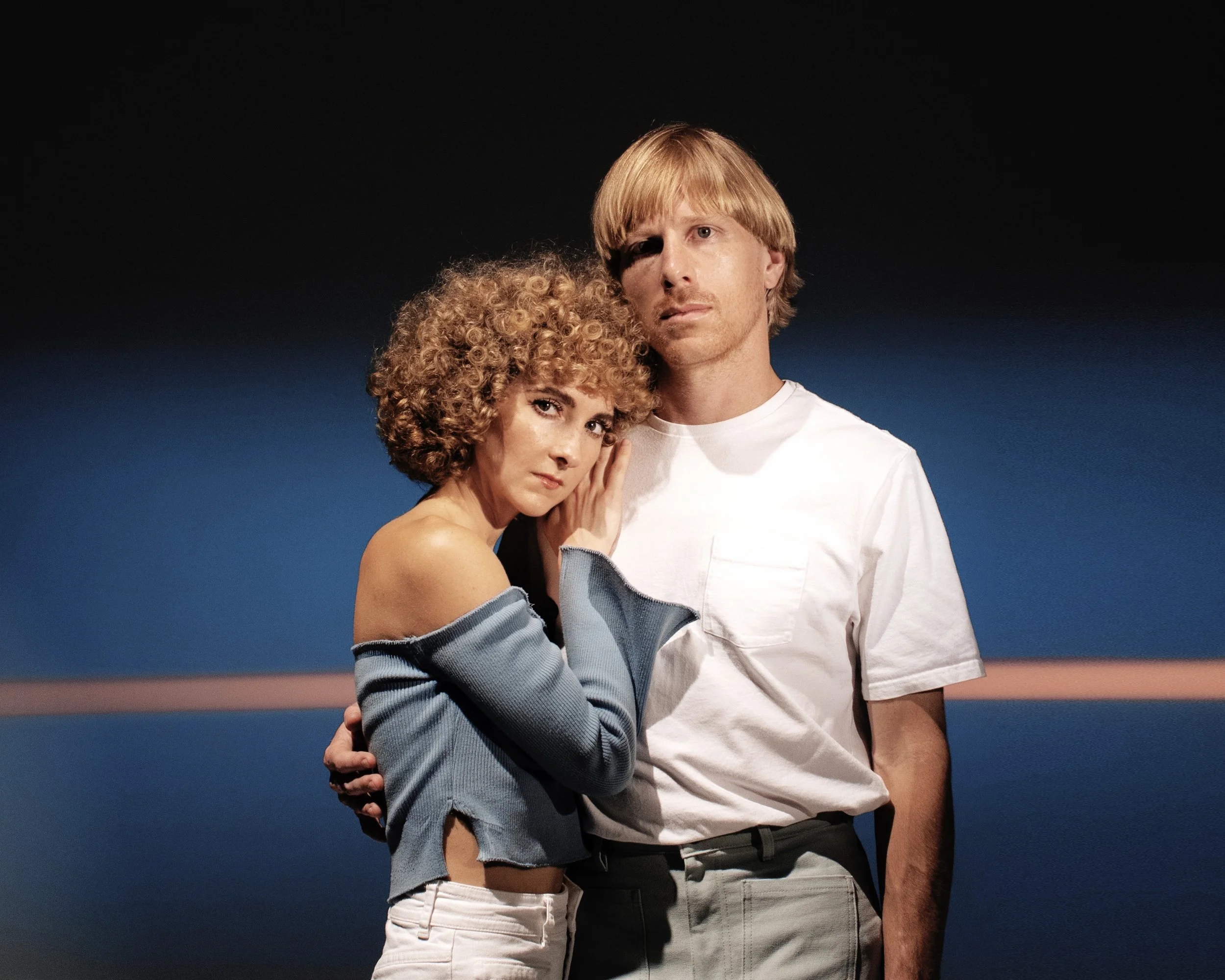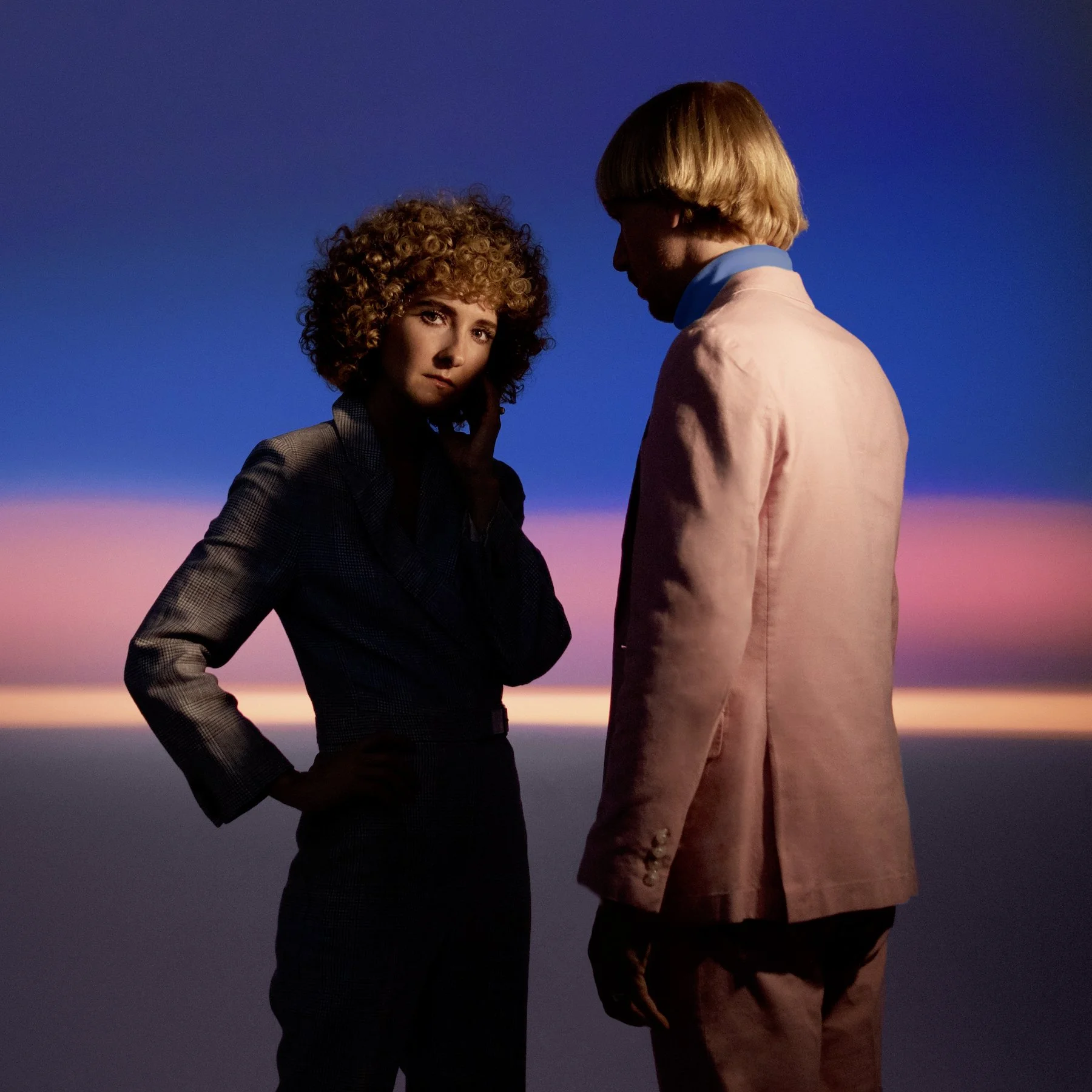Tennis Interview
From fleeting moments to eternal melodies, Tennis’ Pollen captures the quiet magic of love, memory and the invisible currents that carry us toward change.
As I try to convey the essence of Tennis’ beautiful music, I can’t help but imagine being whisked away to a serene seaside setting. The undulating rhythms of their sonic tapestry wash over like the gentle lapping of the ocean’s waves, their effervescence instilling an undeniable sense of euphoria and boundless wanderlust. Each note reverberates like the very heartbeat of the sea, its ebullience culminating in a mesmerizing symphony of instrumentation that ebbs and flows in perfect unison. It was in the company of Alaina Moore, the lead vocalist of this illustrious duo, that I was privileged to discuss their latest album, Pollen.
Beneath the surface of their resplendent soundscapes lies a deep-seated nostalgia, a wistful reminiscence of the magical aesthetics of yesteryear — an old photograph faded and worn with time, yet imbued with the warmth of cherished memories long-passed. As Moore regaled us with her thoughts on Pollen, she expounded on the deeply personal significance of the title, elucidating that, while it may denote small, insignificant particles or moments, it symbolized for her the immense power of something minuscule. A force that could either prove detrimental or positively transformative in one’s life. With regards to the song ‘Hotel Valet,’ Moore divulged that it was inspired by the small, seemingly inconsequential moment that ultimately led to her fortuitous encounter with Patrick Riley, her creative and romantic partner for life.
“On a personal level, I’m allergic to pollen and it fucks me up. It was the first song that I wrote, lyrically. It’s about the power of something very small. It could be a particle or a moment or a choice or a relationship, the way that it could undo you or just be a powerful force. For me, it was thinking about those really small things that have huge consequences in your life. Even the song, it’s about me serving Pat breakfast on my morning shift opening a restaurant at 6 a.m. as he got off the graveyard shift doing valet parking at a hotel. And that’s the first time we ever saw each other. But we didn’t meet then, that was just like a powerful dovetailing of a moment that allowed us to meet again later and he recognized me and then ended up being like the partner of a lifetime, creatively and romantically.”
Fascinated by Moore’s explanation of the title and the deeper meaning behind it, I could see why Moore found it difficult to describe the mammoth implications of these moments.
“Yeah, you write it for me, and if you nail it, then I’ll use it,” Moore jokes.
Discussing the process of recording and writing for the album, Moore admitted that the songwriting process for their latest album was difficult, especially as their standards continue to rise with each record. Despite this, the band managed to create a sound that stayed true to the Tennis vibe but still evolved in a new direction.
“Honestly, it was very hard. Pat and I were discussing that every album gets harder. When we first wrote Cape Dory, it was such a novelty to even record something that came from our brains that we were like “Oh my God, this is amazing! As time has passed, we’ve gotten to be much harsher critics of our own work.”
Curious as to what Moore meant by this, I dug deeper. “I’ve done some co-writes with friends and they’re like, “You just threw away 100 ideas that I would have made into a bunch of songs.” And I’m like, ‘I don’t know if I’m spinning out and I’m too critical.’ But yeah, it was a very slow process, but I’m very pleased with where it went. I always want it to sound like Tennis but be slightly evolved in a new direction, and I think that we managed to do that.” Moore explains.
As the music of Tennis unfolded over the years, it bore witness to an undeniable metamorphosis, evident in the intricate and captivating sonic tapestries they wove. Their initial recordings, fashioned within the humble confines of a cramped apartment, utilising only a limited range of instrumentation and GarageBand’s percussive offerings, have since blossomed into sophisticated arrangements that boast a wideranging musical diversity. Yet, as the group journeyed through time and space, they came to realize that capturing the emotional essence of their music was of paramount importance, transcending even the pursuit of sonic perfection.
Speaking to their earlier work, Moore spoke of the beauty found within the imperfections of their first-ever singles for Fire Talk Records, a testament to the power and allure of raw, unbridled passion.
“We, even now, think that those were the superior versions of the songs. But we got in our heads about it. And when we did the whole record in a studio with drums, we felt like we lost some of the magic of the first recordings. But that was something we didn’t understand. We were so new to the entire experience, and now we know that there’s something like magic in the first recording of something. And it doesn’t matter if it was GarageBand and it doesn’t matter if it wasn’t mixed properly. It’s like, did you get the feeling or not? And so now that’s something we’re a lot more aware of and I think we’ve spent our whole career, all the albums, trying to get back to what was special that we found by accident on those first demos that we lost by overthinking it, trying to be perfect. Now we’ve freed ourselves from that and now there’s a lot more spontaneity and we will preserve something we recorded in demo form that’s like an inferior recording if we felt like the feeling and the tone is correct. We won’t redo it and we’ll keep that in the final album version.” Moore shares.
“Richard Swift is the one who helped us tap back into what we were doing intuitively when we first made music.” Shares Moore. “But then we lost the plot because we felt like it’s not good enough, it’s not refined enough. It needs to be recorded better with proper mics and consoles and whatever. And Richard was like, it doesn’t matter how you record it, does it sound good? That’s the only thing that matters. And that helped us reconnect with our first intuitive understanding of music.” Moore further explains.
Despite their artistic vision and perfectionist spirit, there’s a sense of humility in Tennis’ music. They understand that perfection is not their true goal, that it’s the feeling and tone that matter most. It’s like a deep breath of sea air, refreshing and invigorating, reminding us to live in the moment and appreciate the beauty of life.
It’s no wonder that Moore and Riley are heavily involved in the creative direction of their music videos and visual aesthetics, having been completely independent for their last three albums. They understand that their music is more than just a collection of sounds - it’s an immersive experience that engages all the senses. Working with Luca Venter seems like another serendipitous moment for the band; having worked with him for over eight years on their videos and visual aesthetics, the band finally took the reins on their latest video.
“Luca has been very formative of our whole creative direction and has taught us so much. We’ve always worked together and been very DIY. He directed One Night with The Valet with us, our first video for this record, and from then on, Pat and I have done everything else. It’s been fun to step out and take everything we’ve learned from Luca and implement it. I want him to be proud of me, like my teacher or something.” Shares Moore.
In a music industry that often prioritises profit over artistic integrity, Tennis stands out as a shining example of what’s possible when musicians are given the space and freedom to create music on their own terms. “I didn’t start a rock band so that I could have 20 bosses.” Moore added that labels these days don’t give artists enough time to develop. Using Fleetwood Mac as an example, she explains that they would never have made it in today’s music industry because they would have been dropped after their first album, rather than given the opportunity to blossom into the band they became.
As our conversation draws to a close, I find myself awash with a newfound appreciation for the band Tennis and their exceptional creative process. Their music feels like a summer breeze: a gentle and effortless sound that brims with vitality and vivacity. Their style is a masterful amalgam of past and present, an intricate musical time capsule that transports the listener to a bygone era while still feeling refreshingly contemporary.
Tennis’ journey thus far has been one of profound evolution. They have come a long way from their early days of recording in a cramped apartment with sparse equipment. With each album, they have deftly cultivated and refined their sound while retaining their core essence. Their latest offering, Pollen, stands as a testament to their remarkable musical growth, their willingness to take bold risks and to experiment with the very fabric of their sound. It is unmistakably clear that Moore and Riley share a profound connection not only to one another but also to their craft. They approach the art of song writing with discipline, structure, and a complete presence of mind, their focus resolutely trained on the creative process. Their unwavering dedication to their craft is evident in the final product: a breath-taking album imbued with depth, emotion, and authenticity.
Photography By: Luca Venters
Interview Taken from Still Listening Magazine Issue Five: 21/04/2023


